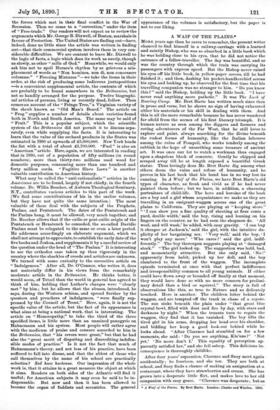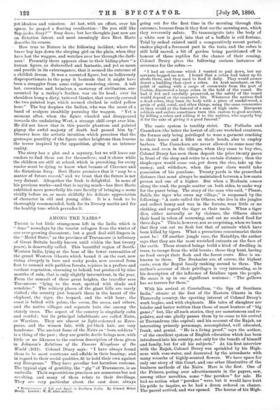A WAIF OF THE PLAINS*
Mona years ago than he cares to remember, the present writer chanced to find himself in a railway-carriage with a learned and saintly Bishop, who was so absorbed in a little book which he was holding close to his eyes, that he did not notice the entrance of a fellow-traveller. The day was beautiful, and so was the country through which the train was carrying its passengers with express speed. But the Bishop never raised his eyes off his little book, in yellow-paper covers, till he had finished it ; and then, dashing his pocket-handkerchief across his eyes and looking up, he observed for the first time that his travelling companion was no stranger to him. " Do you know this ? " said the Bishop, holding up the little book. " I have never read anything more pathetic." It was The Luck of Roaring Camp. Mr. Bret Harte has written much since then in prose and verse, but he shows no sign of having exhausted either his materials or his skill in dealing with them. And this is all the more remarkable because he has never wandered far afield from the scenes of his first literary triumph. It is human nature as seen among the diggers and farmers and roving adventurers of the Far West, that he still loves to explore and paint, always searching for the divine beneath the rudest forms of humanity, like the Italian labourer among the ruins of Pompeii, who works tenderly among the rubbish in the hope of unearthing some treasure of ancient art. It was once our lot to watch a workman thus engaged upon a shapeless block of concrete. Gently he chipped and scraped away till he at length exposed a beautiful Greek statue. Thus lovingly does Mr. Bret Harte dig among what others deem the ruins and refuse of humanity, and he proves in his last book that his hand has in no way lost its cunning. In A Waif of the Plains, we have Bret Harte's old types of character, as fresh and vivid as if he had never painted them before ; but we have, in addition, a charming portraiture of child-life. The hero and heroine of the book are a boy and a girl whose acquaintance we make as they are travelling in an emigrant-waggon across one of the great plains to California. They are playing at " keeping store." " I can show you a fine quality of sheeting at four cents a yard, double width,' said the boy, rising and leaning on his fingers on the counter, as he had seen the shopmen do. All wool, and will wash,' he added, with easy gravity. ' I can buy it cheaper at Jackson's,' said the girl, with the intuitive du- plicity of her bargaining sex. Very well,' said the boy, ' I won't play any more.' Who cares ? ' said the girl, indif- ferently." The boy thereupon suggests playing at " damaged stock." " The girl looked up. The suggestion was bold, bad, and momentarily attractive. But she only said, ' No !' apparently from habit, picked up her doll, and the boy clambered to the front of the waggon. The incomplete episode terminated at once with that perfect indifference and irresponsibility common to all young animals. If either could have flown away or bounded off finally at that moment, they would have done so with no more concern for prelimi- nary detail than a bird or squirrel." The story is full of observations like this, so true to Nature and so delicately touched. Here is another. The children loiter behind the waggon, and are tempted off the track in chase of a coyote. The sun sinks beneath the plain under " that great blue crystal bowl, filled with dust and fire by day, with stars and darkness by night." When the truants turn to regain the waggon, they find that it has vanished. The boy lifts the tired girl in his arms, dropping her head over his shoulder, and bidding her keep a good look-out behind while he looks ahead. "After Clarence had stumbled on for a few moments, she said Do you see anything, Kla'uns ?" Not yet." No more don't I.' This equality of perception ap- parently satisfied her," and she fell asleep. This delicious in- consequence is thoroughly childlike.
After four years' separation, Clarence and Busy meet again accidentally; he fourteen, and she ten. They are both at school, and Sus), fords a chance of making an assignation at a restaurant, where they have strawberries and cream. She has grown into a desperate little flirt, and makes love to her old companion with easy grace. " Clarence was desperate ; but as • A Waif of tho Plains. By Bret Bart.& London : Matta and Winds., 1990. yet idealess and voiceless. At last, with an effort, over his spoon, he gasped a floating recollection : Do you still like flap-jacks, Susy?'" Susy does ; but her thoughts just now are on flirtation intent, and most amusingly does Bret Harte describe its course.
How true to Nature is the following incident, where the brave boy lays down the sleeping girl on the plain, when they have lost the waggon, and watches over her through the dark- ness ! Presently there appears close to their hiding-place " a human figure, so dishevelled and fantastic, and yet so mean and puerile in its extravagance, that it seemed the outcome of a childish dream. It was a mounted figure, but so ludicrously disproportionate to the pony it bestrode that it might have been a straggler from some vulgar wandering circus. A tall hat, crovvnless and brimless, a castaway of civilisation, sur- mounted by a turkey's feather, was on its head; over its shoulders hung a dirty, tattered blanket, that scarcely covered the two painted legs, which seemed clothed in soiled yellow hose." The boy despises the Indian, who was the scout of a band of scalpers stealthily pursuing the waggon. " Yet a moment after, when the figure wheeled and disappeared towards the undulating West, a strange chill crept over him. He did not know that in this puerile phantom and painted pigmy the awful majesty of death had passed him by." Observe here the artistic intuition which perceives that the grotesque puerility of the figure rather heightens than lessens the terror inspired by the apparition, giving it an intenser reality.
The story has a plot and a mystery, but we will leave our readers to find them out for themselves; and it closes while the children are still at school, which is provoking, for every reader must be dying to know what became of Clarence and the flirtatious Susy. Bret Harte promises that it "may be a matter of future record," and we trust that the future is not very distant. Altogether the book is delightful. In none of his previous works—and that is saying much—has Bret Harte exhibited more powerfully his rare faculty of bringing a scene vividly before us, or more skilfully his delicate appreciation of character in old and young alike. It is a book to be thoroughly recommended, both for its literary merits and for the healthy tone which pervades it.



































 Previous page
Previous page